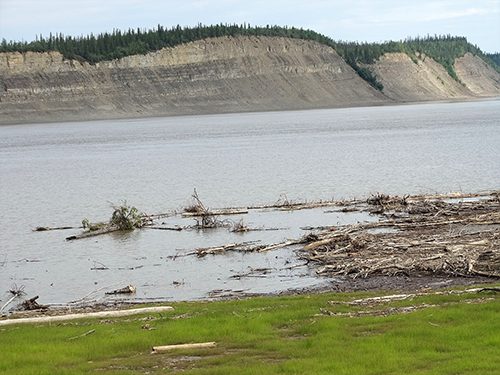Record-low water levels on the Mackenzie River mean that at least two communities in the Northwest Territories will not receive resupply barges this summer, latest evidence that global heating is unravelling supply chains in Northern Canada.
One of them is Norman Wells, a town of around 800 people on the Mackenzie, 530 kilometres south of Tuktoyaktuk. The town depends on barge runs to keep it supplied and connected to the rest of the world, but not this summer. The territorial government said in a news release that the Mackenzie River near Fort Providence is “not navigable and includes obstacles such as large boulders and gravel bars at key manoeuvring areas.”
The river is not safe for barges, though it was navigable around this time last year, reports CBC News. The low river levels come after two years of deepening drought, and will also cut off supplies to the hamlet of Tulita, population 540, located 73 kilometres upriver.
In better times, residents all along the Mackenzie River from Hay River to Tuktoyaktuk could expect to see tugboats pulling cargo-laden barges three times each summer, their passage eased by the currents of the once mighty river.
But last July, “historically low” water levels at Fort Good Hope, 130 kilometres north of Norman Wells, forced all barged cargo destined for points north of that mostly Indigenous community to take a 4,000-kilometre detour by road. The standard barge route from Hay River direct to Inuvik along the Mackenzie spans 1,600 kilometres.
Two months later, the third and final barge to Norman Wells and Tulita was cancelled due to low water. Norman Wells mayor Frank Pope told CBC News he had never seen the Mackenzie river so diminished in the 40 years he had lived in the area.
“It’s been gradually getting worse, but never this bad,” Pope said at the time, adding that losing the river as a reliable supply conduit will imperil the long-term survival of his community.
The mayor and others have been campaigning for an all-season gravel highway that would connect Norman Wells to Wrigley, 90 kilometres to the south, and onwards, “but progress has been repeatedly delayed,” writes CBC.
“Currently, we’ve got nothing else left but air travel, and the cost right now is atrocious,” Pope said. “And it will only get worse. It concerns me, we can’t afford to live up here at the costs we’re subjected to.”
Fast forward eight months, and the summer barge run has ended for Norman Wells and Tulita without even starting.
Alarm bells about low water have been ringing for some time, said Norman Wells Deputy Mayor Pascal Audet. The community is both “very disappointed” and “not surprised at all” by the barge cancellation, he added.
“It’s going to have a huge effect on the community,” he said. Any kind of significant building project or construction project will be postponed due to the lack of materials, and Norman Wells and Tulita will both have to wait for increasingly unreliable winter ice roads.
The barge cancellation news comes just two weeks after the territorial government ordered all cargo destined for communities north of Fort Good Hope to be barged from Tuktoyaktuk, near the shores of the Arctic Ocean, rather than from Hay River. Fort Good Hope is once again the choke point here.
“This operational change is due to extremely low water levels expected around the Rampart Rapids south of Fort Good Hope and is necessary to support the successful delivery of cargo,” said the government. It will ensure that any cargo already at the Hay River terminal, or in transit there, makes it to Tuktoyaktuk, but warned that thereafter, shippers will have to make their own arrangements.
Barge runs from Tuktoyaktuk will be made easier by the fact that the terminal there will be opening on July 2, “three weeks earlier than usual,” writes the CBC.
The North’s resupply nightmare does not end with low water in the Mackenzie. The vital Canadian National Railway (CN) line that connects Hay River to the south was damaged by wildfires last summer and has not yet been repaired, reports Cabin Radio.
According to an unnamed government official, CN has said it will not repair the 30-kilometre stretch of track unless it receives government funding to do so. But the railway had a healthy first quarter, Cabin Radio writes. It “reported net income of around C$1.1 billion for the first three months of 2024.”











